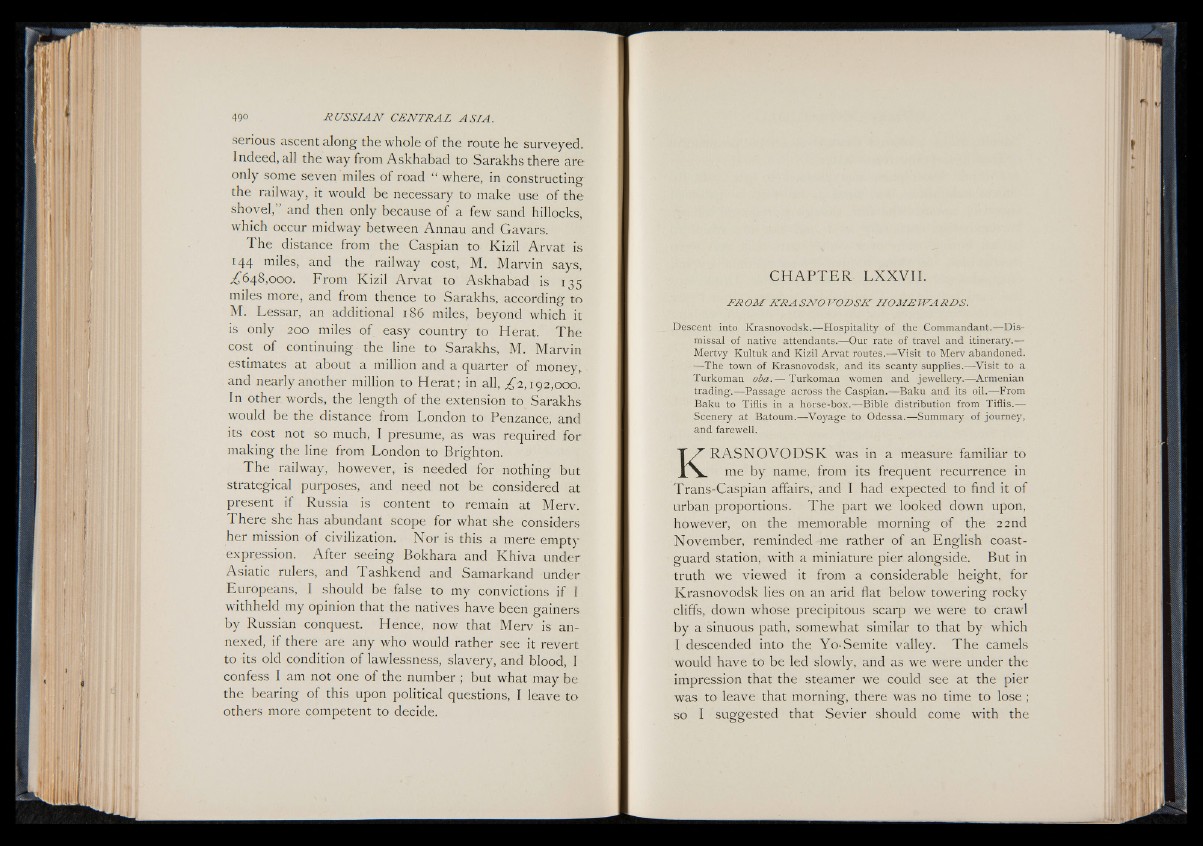
serious ascent along the whole of the route he surveyed.
Indeed, all the way from Askhabad to Sarakhs there are
only some seven miles of road “ where, in constructing
the railway, it would be necessary to make use of the
shovel,” and then only because of a few sand hillocks,
which occur midway between Annau and Gavars.
The distance from the Caspian to Kizil Arvat is
: 44 miles, and the railway cost, M. Marvin says,
,£648,000. From Kizil Arvat to Askhabad is 135
miles more, and from thence to Sarakhs, according to
M. Lessar, an additional 186 miles, beyond which it
is only 200 miles of easy country to Herat. The
cost of continuing the line to Sarakhs, M. Marvin
estimates at about a million and a quarter of money,
and nearly another million to Herat; in all, £"2,192,000.
In other words, the length of the extension to Sarakhs
would be the distance from London to Penzance, and
its cost not so much, I presume, as was required for
making the line from London to Brighton.
T h e railway, however, is needed for nothing but
strategical purposes, and need not be considered at
present if Russia is content to remain at Merv.
There she has abundant scope for what she considers
her mission of civilization. Nor is this a mere empty
expression. After seeing Bokhara and Khiva under
Asiatic rulers, and Tashkend and Samarkand under
Europeans, I should be false to my convictions if I
withheld my opinion that the natives have been gainers
by Russian conquest. Hence, now that Merv is annexed,
if there are any who would rather see it revert
to its old condition o f lawlessness, slavery, and blood, I
confess I am not one o f the number ; but what may be
the bearing of this upon political questions, I leave to
others more competent to decide.
C H A P T E R L X X V I I .
FROM K R A SN O VODSK HOMEWARDS.
Descent into Krasnovodsk.— Hospitality of the Commandant.— Dismissal
of native attendants.— Our rate of travel and itinerary.—
Mertvy Kultuk and Kizil Arvat routes.—Visit to Merv abandoned.
-— The town of Krasnovodsk, and its scanty supplies.—Visit to a
Turkoman oba.— Turkoman women and jewellery.—Armenian
trading.— Passage across the Caspian.—Baku and its oil.—From
Baku to Tiflis in a horse-box.— Bible distribution from Tiflis.—
Scenery at Batoum.-—Voyage to Odessa.—Summary of journey,
and farewell.
KR A S N O V O D S K was in a measure familiar to
me by name, from its frequent recurrence in
Trans-Caspian affairs, and I had expected to find it of
urban proportions. T he part we looked down upon,
however, on the memorable morning of the 22 nd
November, reminded me rather of an English coastguard
station, with a miniature pier alongside. But in
truth we viewed it from a considerable height, for
Krasnovodsk lies on an arid flat below towering rocky
cliffs, down whose precipitous scarp we were to crawl
by a sinuous path, somewhat similar to that by which
I descended into the Yo-Semite valley. T he camels
would have to be led slowly, and as we were under the
impression that the steamer we could see at the pier
was to leave that morning, there was no time to lose ;
so I suggested that Sevier should come with the